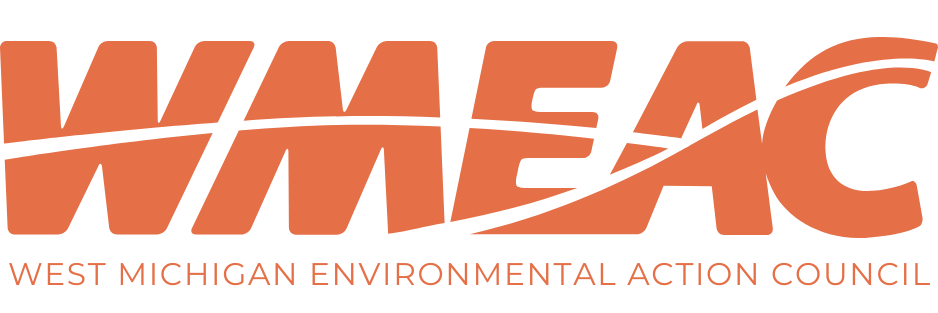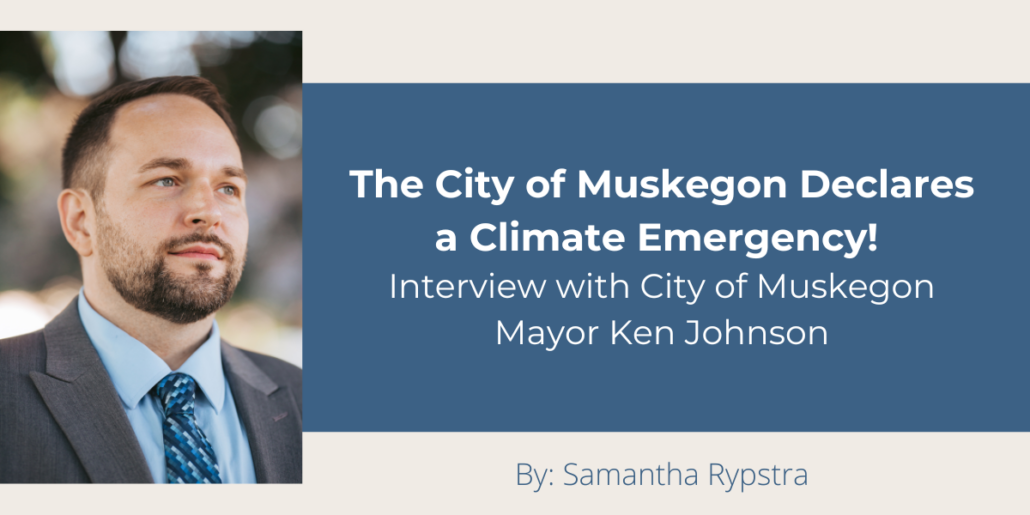Interview with City of Muskegon Mayor Ken Johnson
By: WMEAC Lakeshore Fellow Samantha Rypstra
Unpredictable weather patterns, and rising water levels directly tied to climate change are being seen across the globe and the West Michigan lakeshore is no exception. When asked in a 2022 survey, representatives from the city of Muskegon noted seeing direct impacts of climate change in their community. One of the biggest ways the leaders were seeing the impacts of climate change were in rising water levels, controlled mostly by rainfall. City officials referenced research from the U.S. Army Corps of Engineers (USACE) that showed the period from 2019 to 2020 setting record water levels in the area. Officials noted that the high water levels at the time created problems for many private property owners along the state’s Lake Michigan coastline, as well as the city’s own shoreline parks infrastructure, and caused many damages and changes to the shorelines in the area, including Muskegon Lake. Damages stemming from the effects of climate changes have cost residents and the city money and threatened major infrastructure assets, from streets to water mains to park boardwalks. Making a commitment to address climate change and its effects holds the potential to save the city many costs and help to preserve its unique natural landscape for generations to come.
In early April of this year, the city adopted a climate emergency declaration, with unanimous vote of its commissioners. The declaration is the city’s way of acknowledging that human-made climate change and its negative effects are impacting the businesses, residents and visitors of the city. The climate emergency declaration includes a plan for the city to reduce its emissions with a goal of zero greenhouse gas emissions by the year 2040. This declaration follows in the footsteps of the city of Montague which in 2020 made the first such declaration in Muskegon County, followed by the city of Whitehall in 2021. These West Michigan towns declaring climate emergencies are a part of a global movement of governments making similar pledges.
WMEAC reached out to City of Muskegon Mayor Ken Johnson to learn a bit more about the declaration and what it means for the city.
WMEAC: Why did the city declare a climate emergency?
Mayor Ken Johnson: To recognize a global problem, the harm the problem poses to our community, and humanity’s contributions to that problem, while focusing our municipal organization’s attention on becoming part of the solution to that problem.
WMEAC: What does the declaration mean for city operations? For local businesses and residents?
Mayor Ken Johnson: The declaration and its initial intentions are focused on city operations, with the City Commission directing an organizational carbon impact audit to be conducted and delivered to the Commission by December 2023. This baseline carbon footprint assessment will be used to set target reductions in carbon use and output with the goal of eliminating our municipal organization’s greenhouse gas emissions by 2040.
Meanwhile, starting with the Fiscal Year 2023-2024 budget, climate action will be a fiscal consideration. Going forward, the city will review our code of ordinances, with an eye toward changing policy or developing new policies that support a more environmentally sustainable community. Additionally, the city will engage residents, visitors, and businesses on the climate emergency in our creation of a long-term Climate Mobilization Action Plan (Climate MAP).
WMEAC: Will there be education and information for the community?
Mayor Ken Johnson: There will be engagement in development of the Climate MAP, which itself I expect will call for further education, information, and engagement of the community in implementing the Climate MAP.
WMEAC: Anything else?
Mayor Ken Johnson: The City of Muskegon has taken numerous steps in recent years to become more environmentally and fiscally sustainable, several of which I’m proud to have championed, including restoring curbside recycling and upgrading our streetlights to LED fixtures. With the Climate Emergency Declaration and the forthcoming Climate MAP, we’re taking a more concerted and concentrated approach to combating climate change and fostering a more environmentally sustainable and climate-resilient community.
WMEAC is excited to see another lakeshore community acknowledging the effects of climate change and pledging to make changes to combat those effects. By making this declaration Muskegon is joining Montague and Whitehall in being leaders in slowing climate change and protecting the unique and beautiful landscapes of the West Michigan lakeshore. We would like to thank the commissioners who made this declaration and especially Mayor Johnson for taking the extra time to share more about it with us. If you are a resident of the city of Muskegon and want to learn more about the climate declaration you can reach out to the city manager, Jonathan Seyferth at Jonathan@shorelinecity.com. If you live in another area of West Michigan without a current climate declaration, encourage your local government to adopt one! Climate change and its effects are all around us and impacting our communities daily, and our individual choices are contributing to it. To learn more about climate change and how you can help, visit our page of information resources here.


